Business Environment Analysis: Unilever, BBC, and Oxfam Report
VerifiedAdded on 2020/06/04
|13
|3072
|31
Report
AI Summary
This report examines the business environment, focusing on Unilever, BBC, and Oxfam. It begins with an introduction to business and the factors affecting it, emphasizing the importance of a suitable environment. Task 1 covers the relationship between organizational functions (planning, organizing, staffing, leading, controlling) and their alignment with goals and structure, using Unilever as a case study. The report delves into the functions of various departments within Unilever, including Research & Development, Production, Finance, Purchasing, Sales & Marketing, and Human Resources. Task 2 presents a PESTLE analysis of both Unilever and BBC, exploring the political, economic, social, technological, legal, and environmental factors influencing their operations. Furthermore, the report includes a SWOT analysis for both companies, examining their strengths, weaknesses, opportunities, and threats, and how these relate to external macro factors. The report concludes by summarizing the key findings and insights from the analyses.
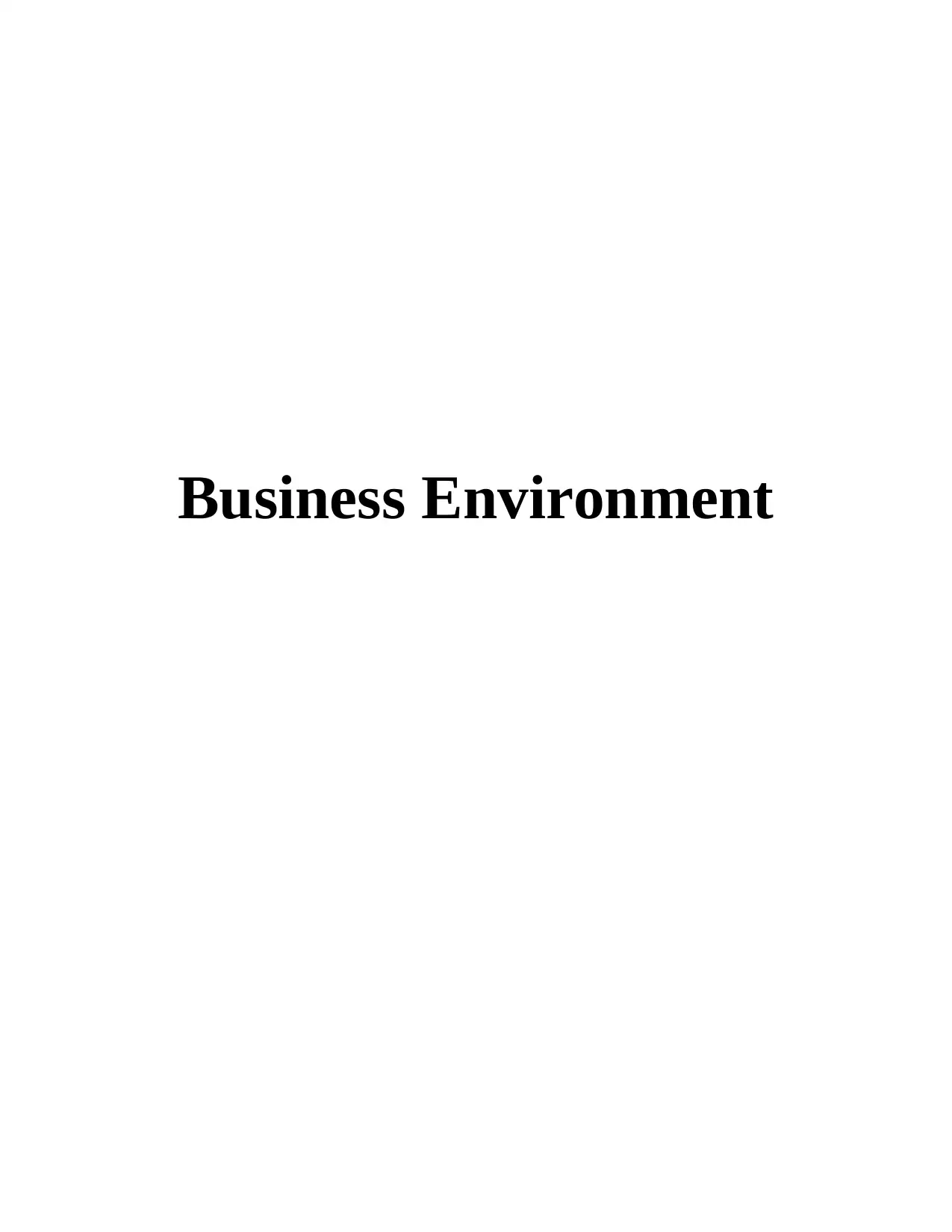
Business Environment
Paraphrase This Document
Need a fresh take? Get an instant paraphrase of this document with our AI Paraphraser
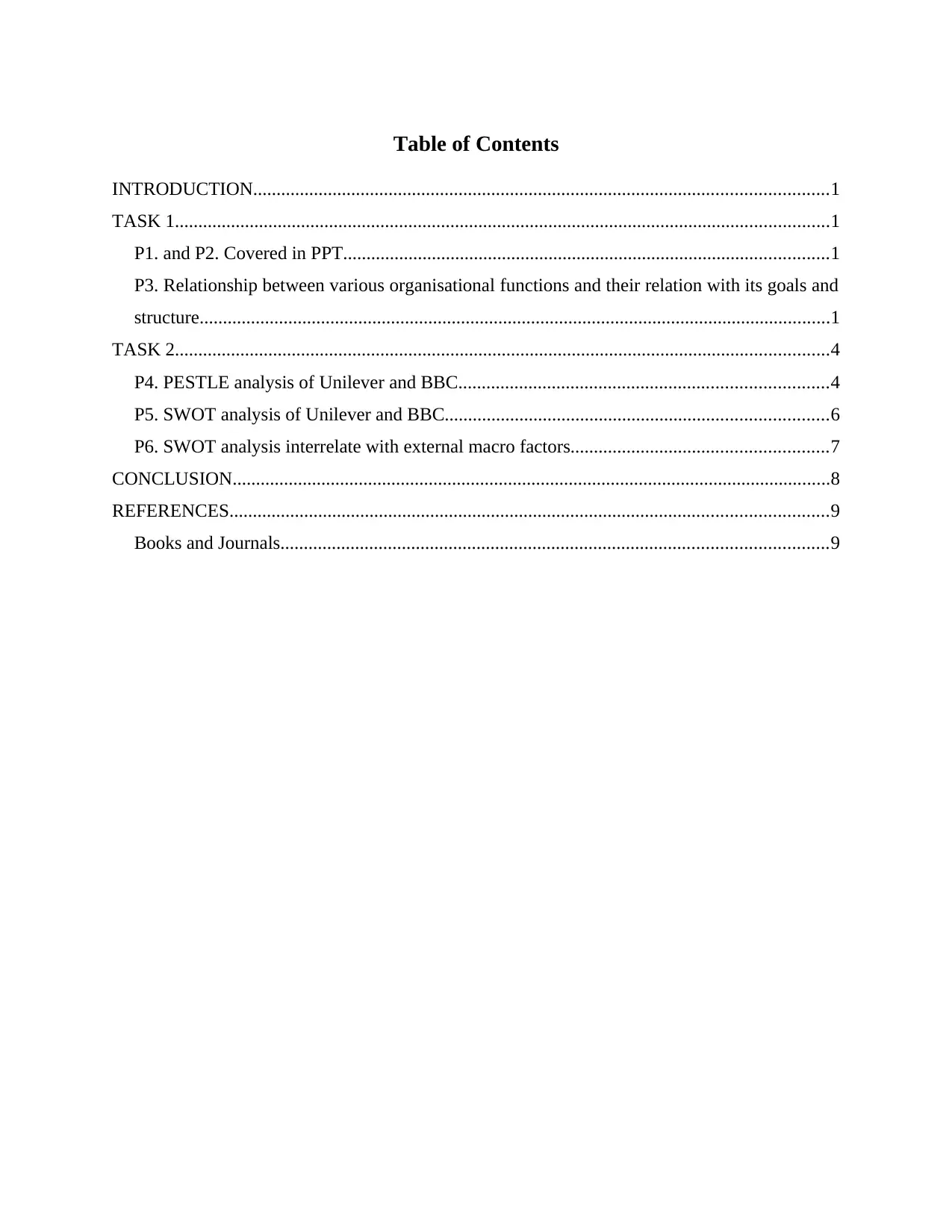
Table of Contents
INTRODUCTION...........................................................................................................................1
TASK 1............................................................................................................................................1
P1. and P2. Covered in PPT........................................................................................................1
P3. Relationship between various organisational functions and their relation with its goals and
structure.......................................................................................................................................1
TASK 2............................................................................................................................................4
P4. PESTLE analysis of Unilever and BBC...............................................................................4
P5. SWOT analysis of Unilever and BBC..................................................................................6
P6. SWOT analysis interrelate with external macro factors.......................................................7
CONCLUSION................................................................................................................................8
REFERENCES................................................................................................................................9
Books and Journals.....................................................................................................................9
INTRODUCTION...........................................................................................................................1
TASK 1............................................................................................................................................1
P1. and P2. Covered in PPT........................................................................................................1
P3. Relationship between various organisational functions and their relation with its goals and
structure.......................................................................................................................................1
TASK 2............................................................................................................................................4
P4. PESTLE analysis of Unilever and BBC...............................................................................4
P5. SWOT analysis of Unilever and BBC..................................................................................6
P6. SWOT analysis interrelate with external macro factors.......................................................7
CONCLUSION................................................................................................................................8
REFERENCES................................................................................................................................9
Books and Journals.....................................................................................................................9
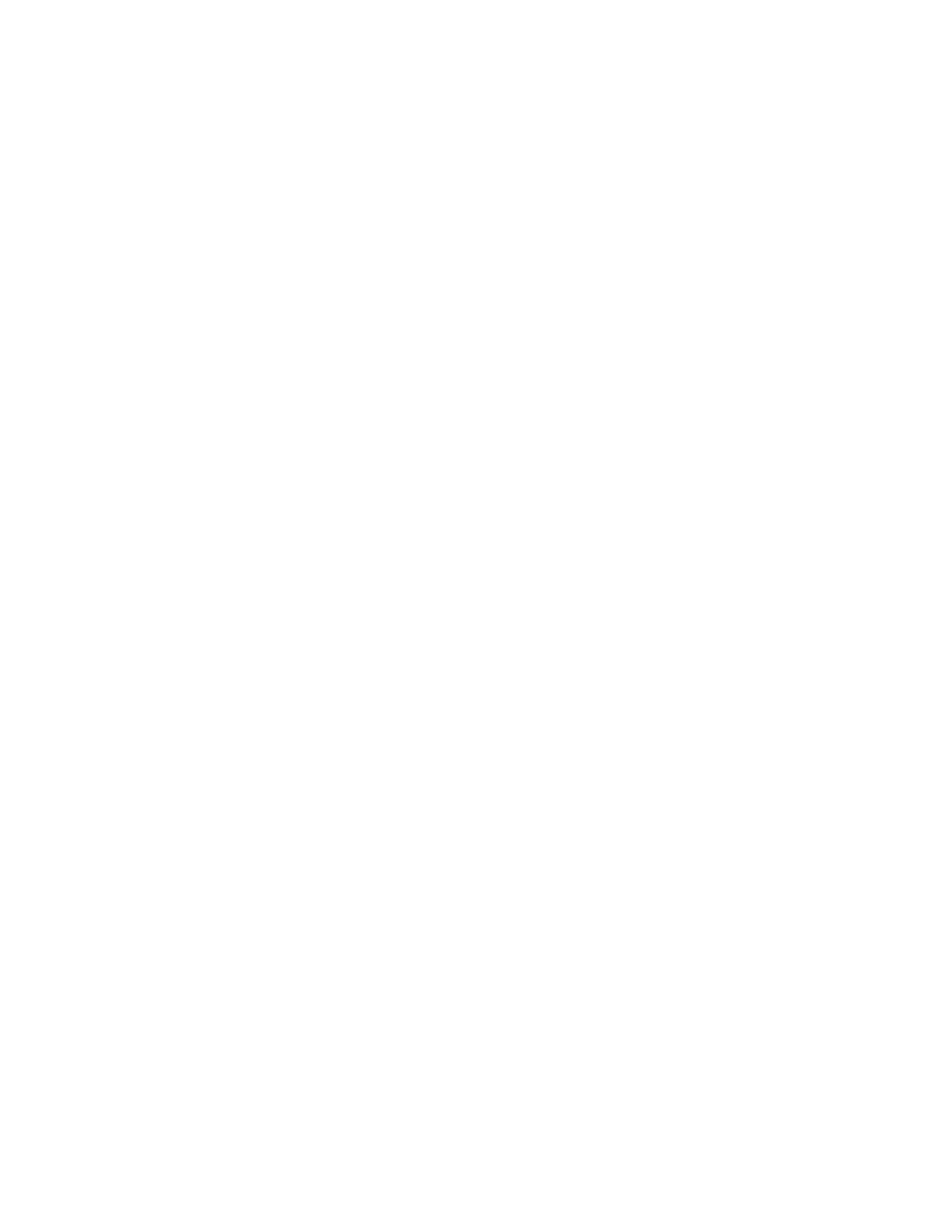
⊘ This is a preview!⊘
Do you want full access?
Subscribe today to unlock all pages.

Trusted by 1+ million students worldwide
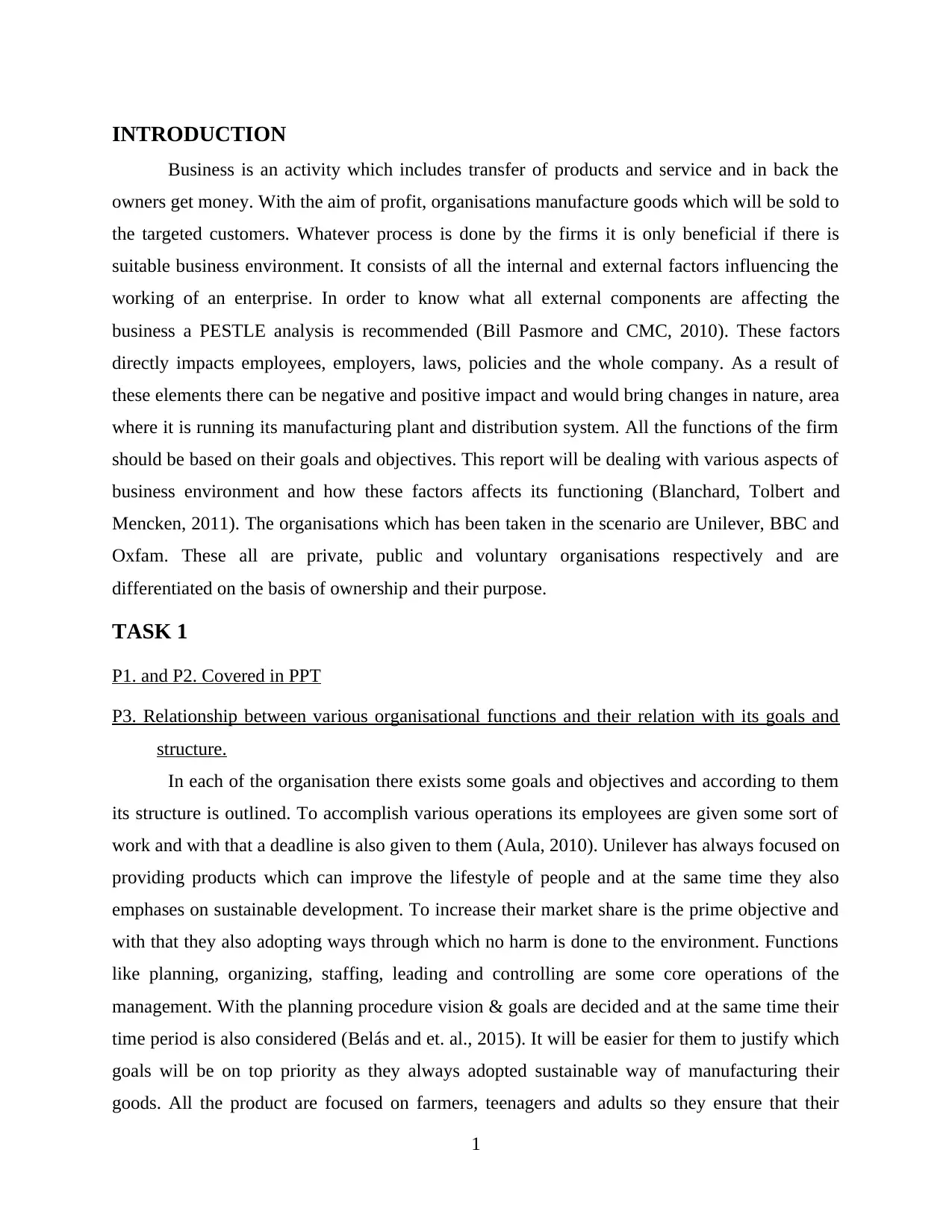
INTRODUCTION
Business is an activity which includes transfer of products and service and in back the
owners get money. With the aim of profit, organisations manufacture goods which will be sold to
the targeted customers. Whatever process is done by the firms it is only beneficial if there is
suitable business environment. It consists of all the internal and external factors influencing the
working of an enterprise. In order to know what all external components are affecting the
business a PESTLE analysis is recommended (Bill Pasmore and CMC, 2010). These factors
directly impacts employees, employers, laws, policies and the whole company. As a result of
these elements there can be negative and positive impact and would bring changes in nature, area
where it is running its manufacturing plant and distribution system. All the functions of the firm
should be based on their goals and objectives. This report will be dealing with various aspects of
business environment and how these factors affects its functioning (Blanchard, Tolbert and
Mencken, 2011). The organisations which has been taken in the scenario are Unilever, BBC and
Oxfam. These all are private, public and voluntary organisations respectively and are
differentiated on the basis of ownership and their purpose.
TASK 1
P1. and P2. Covered in PPT
P3. Relationship between various organisational functions and their relation with its goals and
structure.
In each of the organisation there exists some goals and objectives and according to them
its structure is outlined. To accomplish various operations its employees are given some sort of
work and with that a deadline is also given to them (Aula, 2010). Unilever has always focused on
providing products which can improve the lifestyle of people and at the same time they also
emphases on sustainable development. To increase their market share is the prime objective and
with that they also adopting ways through which no harm is done to the environment. Functions
like planning, organizing, staffing, leading and controlling are some core operations of the
management. With the planning procedure vision & goals are decided and at the same time their
time period is also considered (Belás and et. al., 2015). It will be easier for them to justify which
goals will be on top priority as they always adopted sustainable way of manufacturing their
goods. All the product are focused on farmers, teenagers and adults so they ensure that their
1
Business is an activity which includes transfer of products and service and in back the
owners get money. With the aim of profit, organisations manufacture goods which will be sold to
the targeted customers. Whatever process is done by the firms it is only beneficial if there is
suitable business environment. It consists of all the internal and external factors influencing the
working of an enterprise. In order to know what all external components are affecting the
business a PESTLE analysis is recommended (Bill Pasmore and CMC, 2010). These factors
directly impacts employees, employers, laws, policies and the whole company. As a result of
these elements there can be negative and positive impact and would bring changes in nature, area
where it is running its manufacturing plant and distribution system. All the functions of the firm
should be based on their goals and objectives. This report will be dealing with various aspects of
business environment and how these factors affects its functioning (Blanchard, Tolbert and
Mencken, 2011). The organisations which has been taken in the scenario are Unilever, BBC and
Oxfam. These all are private, public and voluntary organisations respectively and are
differentiated on the basis of ownership and their purpose.
TASK 1
P1. and P2. Covered in PPT
P3. Relationship between various organisational functions and their relation with its goals and
structure.
In each of the organisation there exists some goals and objectives and according to them
its structure is outlined. To accomplish various operations its employees are given some sort of
work and with that a deadline is also given to them (Aula, 2010). Unilever has always focused on
providing products which can improve the lifestyle of people and at the same time they also
emphases on sustainable development. To increase their market share is the prime objective and
with that they also adopting ways through which no harm is done to the environment. Functions
like planning, organizing, staffing, leading and controlling are some core operations of the
management. With the planning procedure vision & goals are decided and at the same time their
time period is also considered (Belás and et. al., 2015). It will be easier for them to justify which
goals will be on top priority as they always adopted sustainable way of manufacturing their
goods. All the product are focused on farmers, teenagers and adults so they ensure that their
1
Paraphrase This Document
Need a fresh take? Get an instant paraphrase of this document with our AI Paraphraser
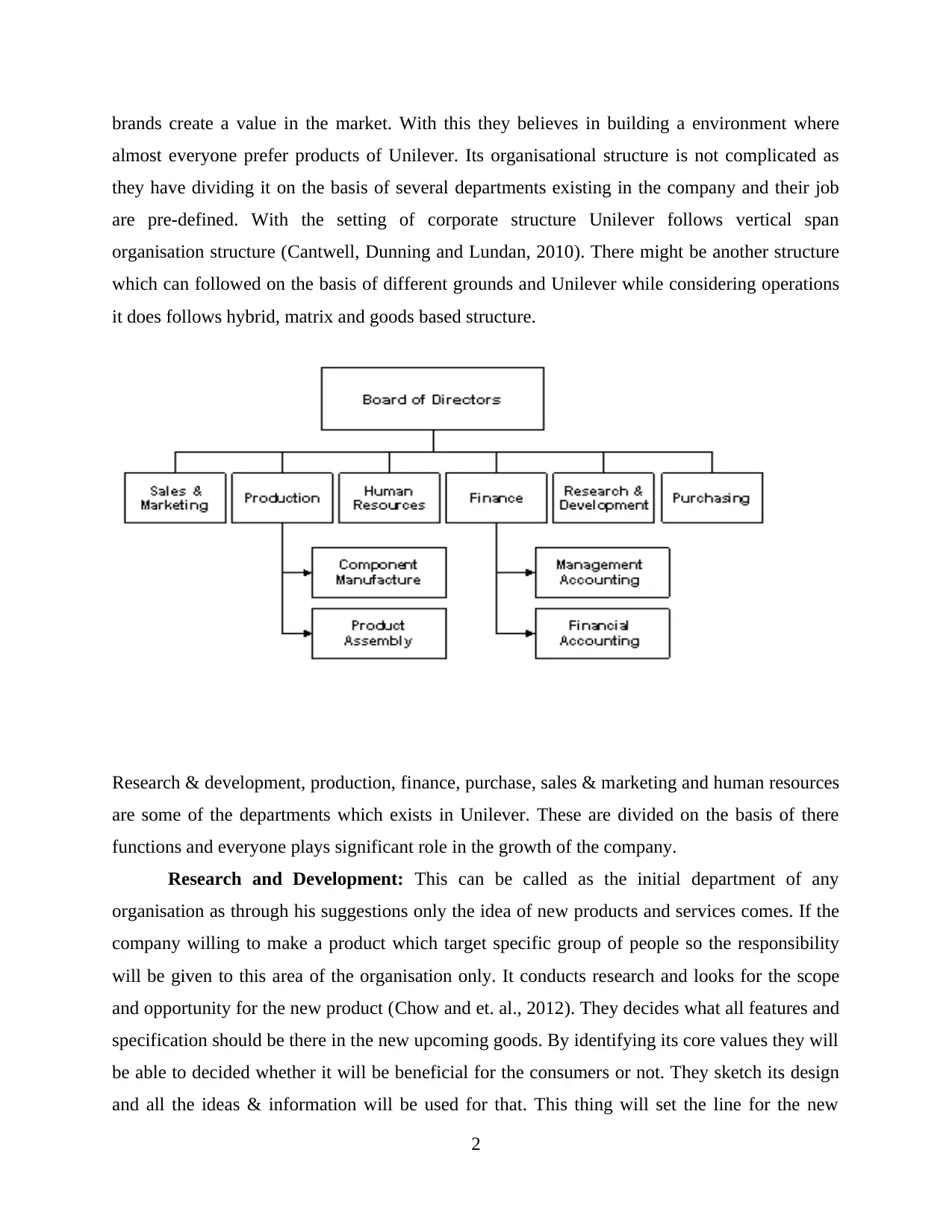
brands create a value in the market. With this they believes in building a environment where
almost everyone prefer products of Unilever. Its organisational structure is not complicated as
they have dividing it on the basis of several departments existing in the company and their job
are pre-defined. With the setting of corporate structure Unilever follows vertical span
organisation structure (Cantwell, Dunning and Lundan, 2010). There might be another structure
which can followed on the basis of different grounds and Unilever while considering operations
it does follows hybrid, matrix and goods based structure.
Research & development, production, finance, purchase, sales & marketing and human resources
are some of the departments which exists in Unilever. These are divided on the basis of there
functions and everyone plays significant role in the growth of the company.
Research and Development: This can be called as the initial department of any
organisation as through his suggestions only the idea of new products and services comes. If the
company willing to make a product which target specific group of people so the responsibility
will be given to this area of the organisation only. It conducts research and looks for the scope
and opportunity for the new product (Chow and et. al., 2012). They decides what all features and
specification should be there in the new upcoming goods. By identifying its core values they will
be able to decided whether it will be beneficial for the consumers or not. They sketch its design
and all the ideas & information will be used for that. This thing will set the line for the new
2
almost everyone prefer products of Unilever. Its organisational structure is not complicated as
they have dividing it on the basis of several departments existing in the company and their job
are pre-defined. With the setting of corporate structure Unilever follows vertical span
organisation structure (Cantwell, Dunning and Lundan, 2010). There might be another structure
which can followed on the basis of different grounds and Unilever while considering operations
it does follows hybrid, matrix and goods based structure.
Research & development, production, finance, purchase, sales & marketing and human resources
are some of the departments which exists in Unilever. These are divided on the basis of there
functions and everyone plays significant role in the growth of the company.
Research and Development: This can be called as the initial department of any
organisation as through his suggestions only the idea of new products and services comes. If the
company willing to make a product which target specific group of people so the responsibility
will be given to this area of the organisation only. It conducts research and looks for the scope
and opportunity for the new product (Chow and et. al., 2012). They decides what all features and
specification should be there in the new upcoming goods. By identifying its core values they will
be able to decided whether it will be beneficial for the consumers or not. They sketch its design
and all the ideas & information will be used for that. This thing will set the line for the new
2
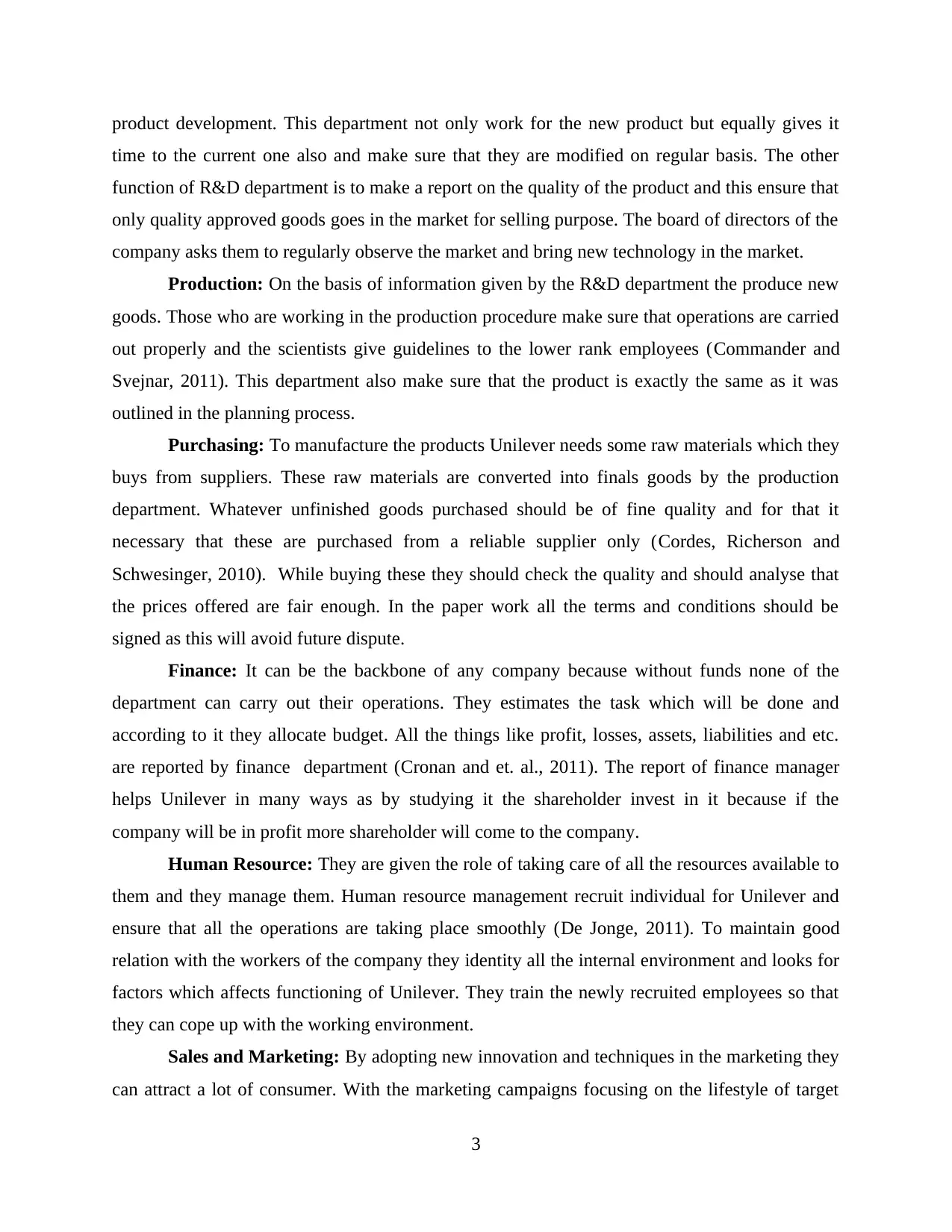
product development. This department not only work for the new product but equally gives it
time to the current one also and make sure that they are modified on regular basis. The other
function of R&D department is to make a report on the quality of the product and this ensure that
only quality approved goods goes in the market for selling purpose. The board of directors of the
company asks them to regularly observe the market and bring new technology in the market.
Production: On the basis of information given by the R&D department the produce new
goods. Those who are working in the production procedure make sure that operations are carried
out properly and the scientists give guidelines to the lower rank employees (Commander and
Svejnar, 2011). This department also make sure that the product is exactly the same as it was
outlined in the planning process.
Purchasing: To manufacture the products Unilever needs some raw materials which they
buys from suppliers. These raw materials are converted into finals goods by the production
department. Whatever unfinished goods purchased should be of fine quality and for that it
necessary that these are purchased from a reliable supplier only (Cordes, Richerson and
Schwesinger, 2010). While buying these they should check the quality and should analyse that
the prices offered are fair enough. In the paper work all the terms and conditions should be
signed as this will avoid future dispute.
Finance: It can be the backbone of any company because without funds none of the
department can carry out their operations. They estimates the task which will be done and
according to it they allocate budget. All the things like profit, losses, assets, liabilities and etc.
are reported by finance department (Cronan and et. al., 2011). The report of finance manager
helps Unilever in many ways as by studying it the shareholder invest in it because if the
company will be in profit more shareholder will come to the company.
Human Resource: They are given the role of taking care of all the resources available to
them and they manage them. Human resource management recruit individual for Unilever and
ensure that all the operations are taking place smoothly (De Jonge, 2011). To maintain good
relation with the workers of the company they identity all the internal environment and looks for
factors which affects functioning of Unilever. They train the newly recruited employees so that
they can cope up with the working environment.
Sales and Marketing: By adopting new innovation and techniques in the marketing they
can attract a lot of consumer. With the marketing campaigns focusing on the lifestyle of target
3
time to the current one also and make sure that they are modified on regular basis. The other
function of R&D department is to make a report on the quality of the product and this ensure that
only quality approved goods goes in the market for selling purpose. The board of directors of the
company asks them to regularly observe the market and bring new technology in the market.
Production: On the basis of information given by the R&D department the produce new
goods. Those who are working in the production procedure make sure that operations are carried
out properly and the scientists give guidelines to the lower rank employees (Commander and
Svejnar, 2011). This department also make sure that the product is exactly the same as it was
outlined in the planning process.
Purchasing: To manufacture the products Unilever needs some raw materials which they
buys from suppliers. These raw materials are converted into finals goods by the production
department. Whatever unfinished goods purchased should be of fine quality and for that it
necessary that these are purchased from a reliable supplier only (Cordes, Richerson and
Schwesinger, 2010). While buying these they should check the quality and should analyse that
the prices offered are fair enough. In the paper work all the terms and conditions should be
signed as this will avoid future dispute.
Finance: It can be the backbone of any company because without funds none of the
department can carry out their operations. They estimates the task which will be done and
according to it they allocate budget. All the things like profit, losses, assets, liabilities and etc.
are reported by finance department (Cronan and et. al., 2011). The report of finance manager
helps Unilever in many ways as by studying it the shareholder invest in it because if the
company will be in profit more shareholder will come to the company.
Human Resource: They are given the role of taking care of all the resources available to
them and they manage them. Human resource management recruit individual for Unilever and
ensure that all the operations are taking place smoothly (De Jonge, 2011). To maintain good
relation with the workers of the company they identity all the internal environment and looks for
factors which affects functioning of Unilever. They train the newly recruited employees so that
they can cope up with the working environment.
Sales and Marketing: By adopting new innovation and techniques in the marketing they
can attract a lot of consumer. With the marketing campaigns focusing on the lifestyle of target
3
⊘ This is a preview!⊘
Do you want full access?
Subscribe today to unlock all pages.

Trusted by 1+ million students worldwide
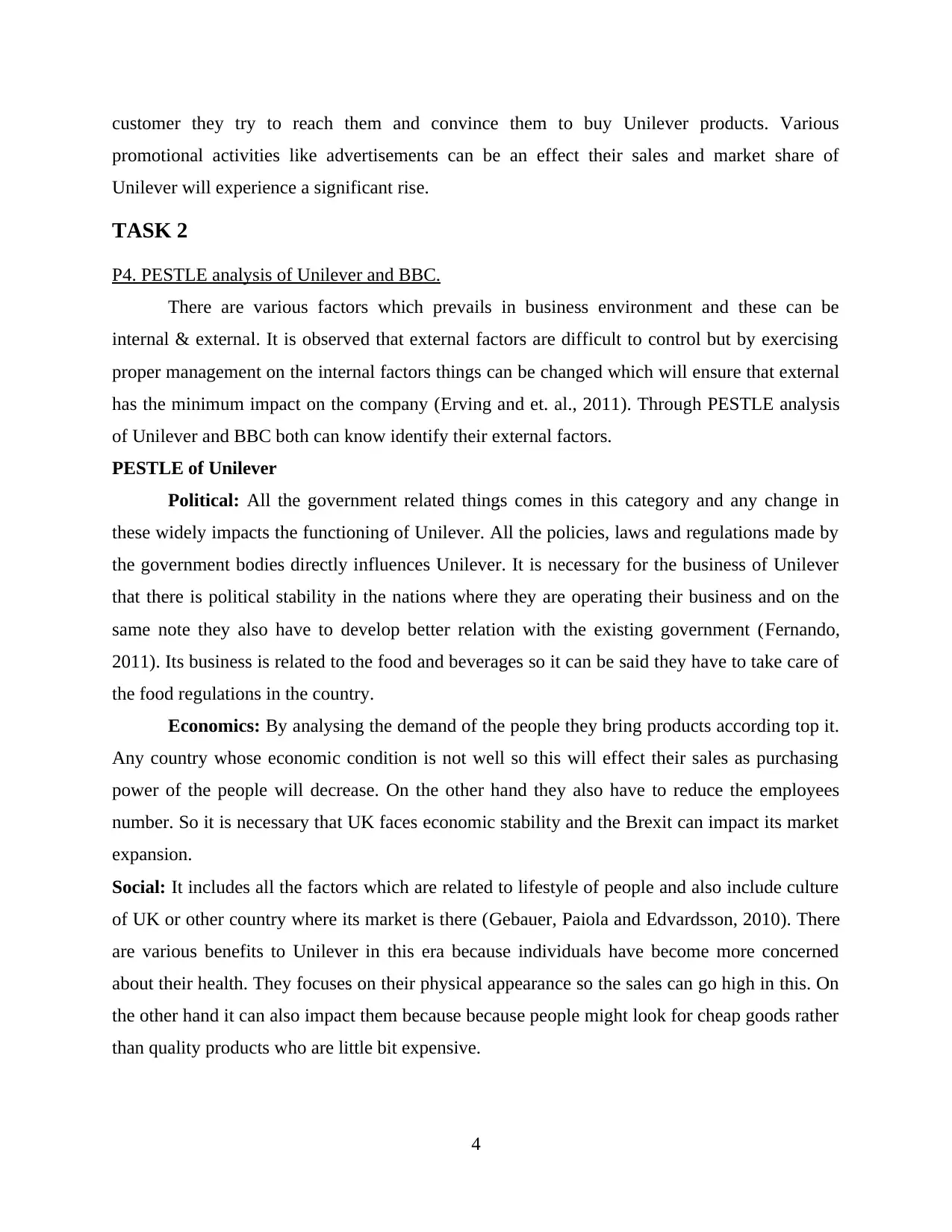
customer they try to reach them and convince them to buy Unilever products. Various
promotional activities like advertisements can be an effect their sales and market share of
Unilever will experience a significant rise.
TASK 2
P4. PESTLE analysis of Unilever and BBC.
There are various factors which prevails in business environment and these can be
internal & external. It is observed that external factors are difficult to control but by exercising
proper management on the internal factors things can be changed which will ensure that external
has the minimum impact on the company (Erving and et. al., 2011). Through PESTLE analysis
of Unilever and BBC both can know identify their external factors.
PESTLE of Unilever
Political: All the government related things comes in this category and any change in
these widely impacts the functioning of Unilever. All the policies, laws and regulations made by
the government bodies directly influences Unilever. It is necessary for the business of Unilever
that there is political stability in the nations where they are operating their business and on the
same note they also have to develop better relation with the existing government (Fernando,
2011). Its business is related to the food and beverages so it can be said they have to take care of
the food regulations in the country.
Economics: By analysing the demand of the people they bring products according top it.
Any country whose economic condition is not well so this will effect their sales as purchasing
power of the people will decrease. On the other hand they also have to reduce the employees
number. So it is necessary that UK faces economic stability and the Brexit can impact its market
expansion.
Social: It includes all the factors which are related to lifestyle of people and also include culture
of UK or other country where its market is there (Gebauer, Paiola and Edvardsson, 2010). There
are various benefits to Unilever in this era because individuals have become more concerned
about their health. They focuses on their physical appearance so the sales can go high in this. On
the other hand it can also impact them because because people might look for cheap goods rather
than quality products who are little bit expensive.
4
promotional activities like advertisements can be an effect their sales and market share of
Unilever will experience a significant rise.
TASK 2
P4. PESTLE analysis of Unilever and BBC.
There are various factors which prevails in business environment and these can be
internal & external. It is observed that external factors are difficult to control but by exercising
proper management on the internal factors things can be changed which will ensure that external
has the minimum impact on the company (Erving and et. al., 2011). Through PESTLE analysis
of Unilever and BBC both can know identify their external factors.
PESTLE of Unilever
Political: All the government related things comes in this category and any change in
these widely impacts the functioning of Unilever. All the policies, laws and regulations made by
the government bodies directly influences Unilever. It is necessary for the business of Unilever
that there is political stability in the nations where they are operating their business and on the
same note they also have to develop better relation with the existing government (Fernando,
2011). Its business is related to the food and beverages so it can be said they have to take care of
the food regulations in the country.
Economics: By analysing the demand of the people they bring products according top it.
Any country whose economic condition is not well so this will effect their sales as purchasing
power of the people will decrease. On the other hand they also have to reduce the employees
number. So it is necessary that UK faces economic stability and the Brexit can impact its market
expansion.
Social: It includes all the factors which are related to lifestyle of people and also include culture
of UK or other country where its market is there (Gebauer, Paiola and Edvardsson, 2010). There
are various benefits to Unilever in this era because individuals have become more concerned
about their health. They focuses on their physical appearance so the sales can go high in this. On
the other hand it can also impact them because because people might look for cheap goods rather
than quality products who are little bit expensive.
4
Paraphrase This Document
Need a fresh take? Get an instant paraphrase of this document with our AI Paraphraser
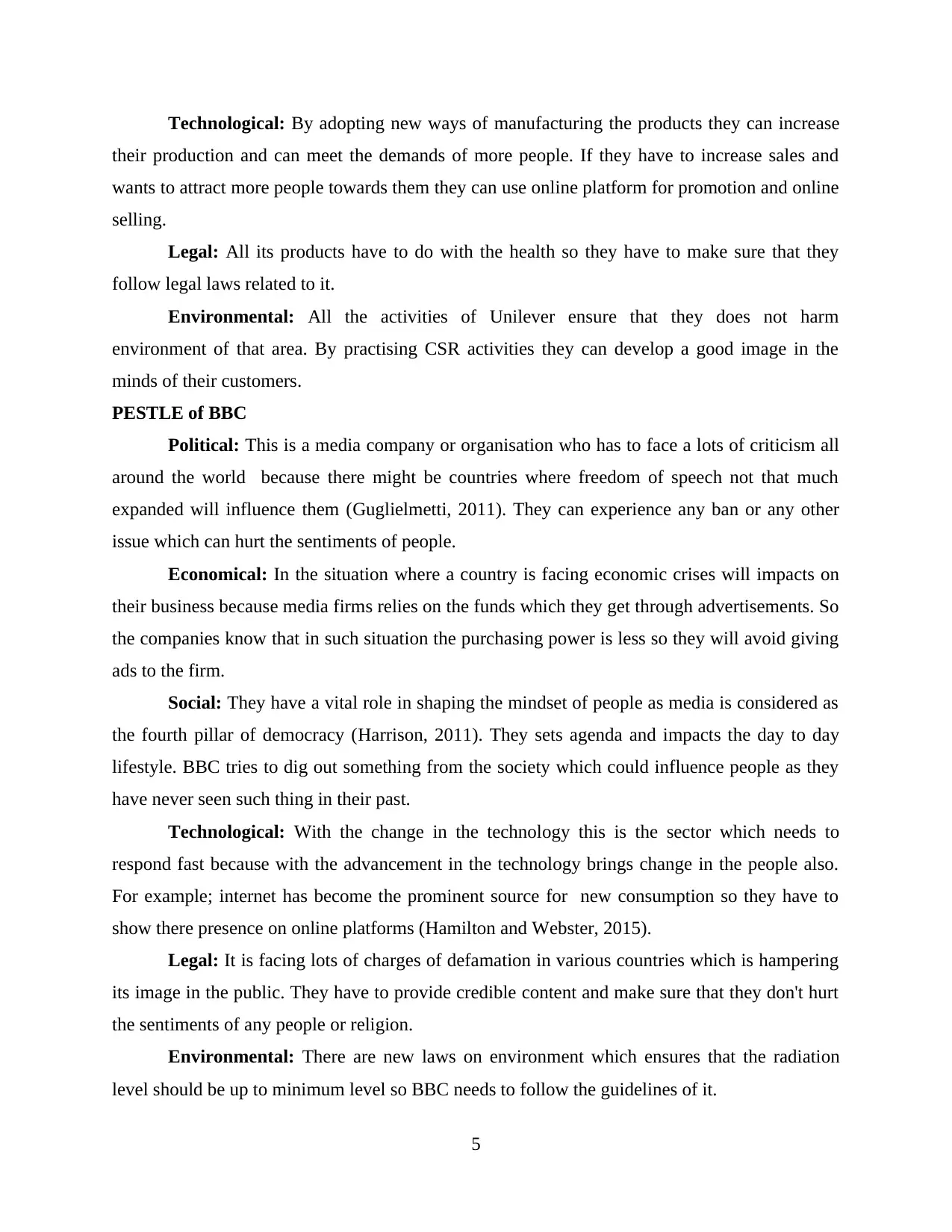
Technological: By adopting new ways of manufacturing the products they can increase
their production and can meet the demands of more people. If they have to increase sales and
wants to attract more people towards them they can use online platform for promotion and online
selling.
Legal: All its products have to do with the health so they have to make sure that they
follow legal laws related to it.
Environmental: All the activities of Unilever ensure that they does not harm
environment of that area. By practising CSR activities they can develop a good image in the
minds of their customers.
PESTLE of BBC
Political: This is a media company or organisation who has to face a lots of criticism all
around the world because there might be countries where freedom of speech not that much
expanded will influence them (Guglielmetti, 2011). They can experience any ban or any other
issue which can hurt the sentiments of people.
Economical: In the situation where a country is facing economic crises will impacts on
their business because media firms relies on the funds which they get through advertisements. So
the companies know that in such situation the purchasing power is less so they will avoid giving
ads to the firm.
Social: They have a vital role in shaping the mindset of people as media is considered as
the fourth pillar of democracy (Harrison, 2011). They sets agenda and impacts the day to day
lifestyle. BBC tries to dig out something from the society which could influence people as they
have never seen such thing in their past.
Technological: With the change in the technology this is the sector which needs to
respond fast because with the advancement in the technology brings change in the people also.
For example; internet has become the prominent source for new consumption so they have to
show there presence on online platforms (Hamilton and Webster, 2015).
Legal: It is facing lots of charges of defamation in various countries which is hampering
its image in the public. They have to provide credible content and make sure that they don't hurt
the sentiments of any people or religion.
Environmental: There are new laws on environment which ensures that the radiation
level should be up to minimum level so BBC needs to follow the guidelines of it.
5
their production and can meet the demands of more people. If they have to increase sales and
wants to attract more people towards them they can use online platform for promotion and online
selling.
Legal: All its products have to do with the health so they have to make sure that they
follow legal laws related to it.
Environmental: All the activities of Unilever ensure that they does not harm
environment of that area. By practising CSR activities they can develop a good image in the
minds of their customers.
PESTLE of BBC
Political: This is a media company or organisation who has to face a lots of criticism all
around the world because there might be countries where freedom of speech not that much
expanded will influence them (Guglielmetti, 2011). They can experience any ban or any other
issue which can hurt the sentiments of people.
Economical: In the situation where a country is facing economic crises will impacts on
their business because media firms relies on the funds which they get through advertisements. So
the companies know that in such situation the purchasing power is less so they will avoid giving
ads to the firm.
Social: They have a vital role in shaping the mindset of people as media is considered as
the fourth pillar of democracy (Harrison, 2011). They sets agenda and impacts the day to day
lifestyle. BBC tries to dig out something from the society which could influence people as they
have never seen such thing in their past.
Technological: With the change in the technology this is the sector which needs to
respond fast because with the advancement in the technology brings change in the people also.
For example; internet has become the prominent source for new consumption so they have to
show there presence on online platforms (Hamilton and Webster, 2015).
Legal: It is facing lots of charges of defamation in various countries which is hampering
its image in the public. They have to provide credible content and make sure that they don't hurt
the sentiments of any people or religion.
Environmental: There are new laws on environment which ensures that the radiation
level should be up to minimum level so BBC needs to follow the guidelines of it.
5
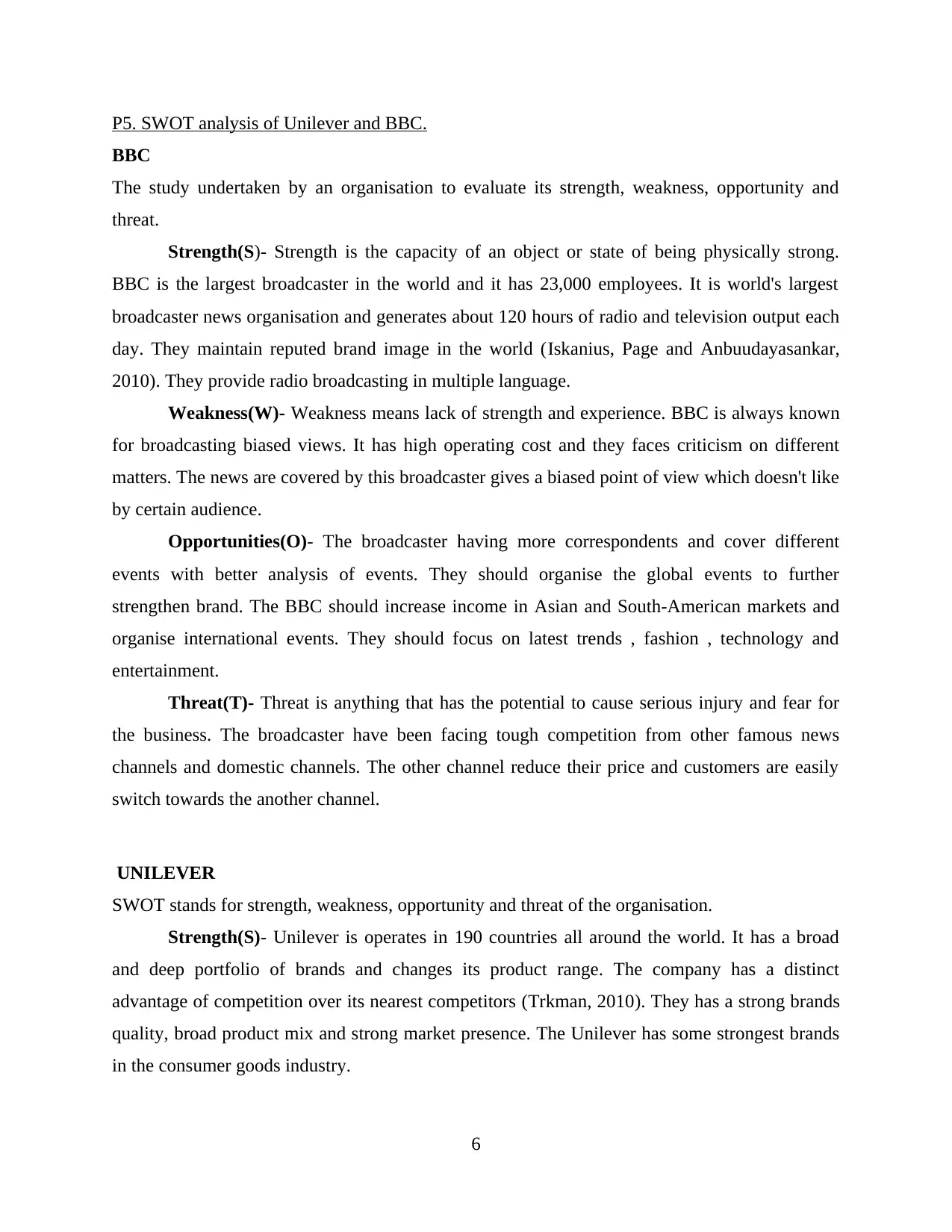
P5. SWOT analysis of Unilever and BBC.
BBC
The study undertaken by an organisation to evaluate its strength, weakness, opportunity and
threat.
Strength(S)- Strength is the capacity of an object or state of being physically strong.
BBC is the largest broadcaster in the world and it has 23,000 employees. It is world's largest
broadcaster news organisation and generates about 120 hours of radio and television output each
day. They maintain reputed brand image in the world (Iskanius, Page and Anbuudayasankar,
2010). They provide radio broadcasting in multiple language.
Weakness(W)- Weakness means lack of strength and experience. BBC is always known
for broadcasting biased views. It has high operating cost and they faces criticism on different
matters. The news are covered by this broadcaster gives a biased point of view which doesn't like
by certain audience.
Opportunities(O)- The broadcaster having more correspondents and cover different
events with better analysis of events. They should organise the global events to further
strengthen brand. The BBC should increase income in Asian and South-American markets and
organise international events. They should focus on latest trends , fashion , technology and
entertainment.
Threat(T)- Threat is anything that has the potential to cause serious injury and fear for
the business. The broadcaster have been facing tough competition from other famous news
channels and domestic channels. The other channel reduce their price and customers are easily
switch towards the another channel.
UNILEVER
SWOT stands for strength, weakness, opportunity and threat of the organisation.
Strength(S)- Unilever is operates in 190 countries all around the world. It has a broad
and deep portfolio of brands and changes its product range. The company has a distinct
advantage of competition over its nearest competitors (Trkman, 2010). They has a strong brands
quality, broad product mix and strong market presence. The Unilever has some strongest brands
in the consumer goods industry.
6
BBC
The study undertaken by an organisation to evaluate its strength, weakness, opportunity and
threat.
Strength(S)- Strength is the capacity of an object or state of being physically strong.
BBC is the largest broadcaster in the world and it has 23,000 employees. It is world's largest
broadcaster news organisation and generates about 120 hours of radio and television output each
day. They maintain reputed brand image in the world (Iskanius, Page and Anbuudayasankar,
2010). They provide radio broadcasting in multiple language.
Weakness(W)- Weakness means lack of strength and experience. BBC is always known
for broadcasting biased views. It has high operating cost and they faces criticism on different
matters. The news are covered by this broadcaster gives a biased point of view which doesn't like
by certain audience.
Opportunities(O)- The broadcaster having more correspondents and cover different
events with better analysis of events. They should organise the global events to further
strengthen brand. The BBC should increase income in Asian and South-American markets and
organise international events. They should focus on latest trends , fashion , technology and
entertainment.
Threat(T)- Threat is anything that has the potential to cause serious injury and fear for
the business. The broadcaster have been facing tough competition from other famous news
channels and domestic channels. The other channel reduce their price and customers are easily
switch towards the another channel.
UNILEVER
SWOT stands for strength, weakness, opportunity and threat of the organisation.
Strength(S)- Unilever is operates in 190 countries all around the world. It has a broad
and deep portfolio of brands and changes its product range. The company has a distinct
advantage of competition over its nearest competitors (Trkman, 2010). They has a strong brands
quality, broad product mix and strong market presence. The Unilever has some strongest brands
in the consumer goods industry.
6
⊘ This is a preview!⊘
Do you want full access?
Subscribe today to unlock all pages.

Trusted by 1+ million students worldwide
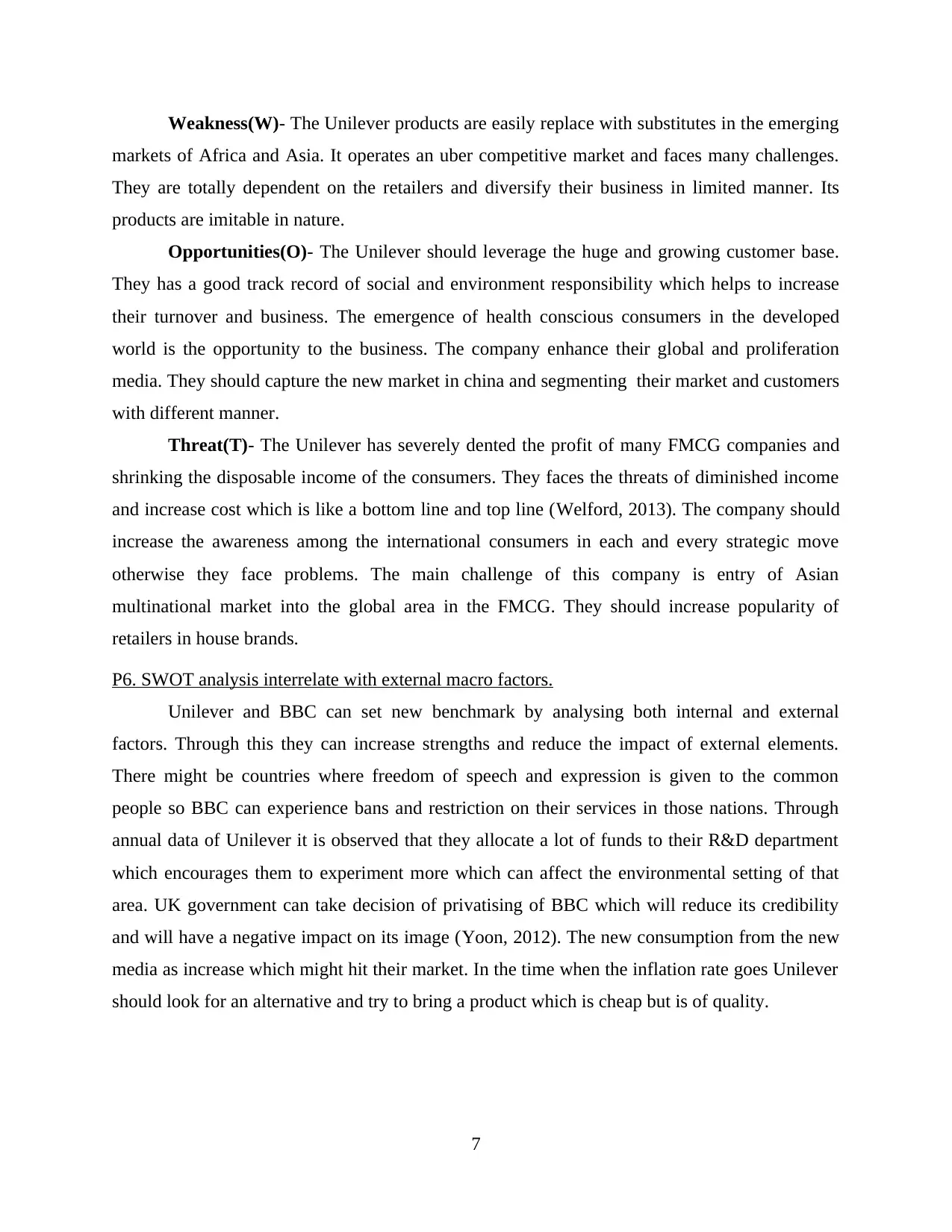
Weakness(W)- The Unilever products are easily replace with substitutes in the emerging
markets of Africa and Asia. It operates an uber competitive market and faces many challenges.
They are totally dependent on the retailers and diversify their business in limited manner. Its
products are imitable in nature.
Opportunities(O)- The Unilever should leverage the huge and growing customer base.
They has a good track record of social and environment responsibility which helps to increase
their turnover and business. The emergence of health conscious consumers in the developed
world is the opportunity to the business. The company enhance their global and proliferation
media. They should capture the new market in china and segmenting their market and customers
with different manner.
Threat(T)- The Unilever has severely dented the profit of many FMCG companies and
shrinking the disposable income of the consumers. They faces the threats of diminished income
and increase cost which is like a bottom line and top line (Welford, 2013). The company should
increase the awareness among the international consumers in each and every strategic move
otherwise they face problems. The main challenge of this company is entry of Asian
multinational market into the global area in the FMCG. They should increase popularity of
retailers in house brands.
P6. SWOT analysis interrelate with external macro factors.
Unilever and BBC can set new benchmark by analysing both internal and external
factors. Through this they can increase strengths and reduce the impact of external elements.
There might be countries where freedom of speech and expression is given to the common
people so BBC can experience bans and restriction on their services in those nations. Through
annual data of Unilever it is observed that they allocate a lot of funds to their R&D department
which encourages them to experiment more which can affect the environmental setting of that
area. UK government can take decision of privatising of BBC which will reduce its credibility
and will have a negative impact on its image (Yoon, 2012). The new consumption from the new
media as increase which might hit their market. In the time when the inflation rate goes Unilever
should look for an alternative and try to bring a product which is cheap but is of quality.
7
markets of Africa and Asia. It operates an uber competitive market and faces many challenges.
They are totally dependent on the retailers and diversify their business in limited manner. Its
products are imitable in nature.
Opportunities(O)- The Unilever should leverage the huge and growing customer base.
They has a good track record of social and environment responsibility which helps to increase
their turnover and business. The emergence of health conscious consumers in the developed
world is the opportunity to the business. The company enhance their global and proliferation
media. They should capture the new market in china and segmenting their market and customers
with different manner.
Threat(T)- The Unilever has severely dented the profit of many FMCG companies and
shrinking the disposable income of the consumers. They faces the threats of diminished income
and increase cost which is like a bottom line and top line (Welford, 2013). The company should
increase the awareness among the international consumers in each and every strategic move
otherwise they face problems. The main challenge of this company is entry of Asian
multinational market into the global area in the FMCG. They should increase popularity of
retailers in house brands.
P6. SWOT analysis interrelate with external macro factors.
Unilever and BBC can set new benchmark by analysing both internal and external
factors. Through this they can increase strengths and reduce the impact of external elements.
There might be countries where freedom of speech and expression is given to the common
people so BBC can experience bans and restriction on their services in those nations. Through
annual data of Unilever it is observed that they allocate a lot of funds to their R&D department
which encourages them to experiment more which can affect the environmental setting of that
area. UK government can take decision of privatising of BBC which will reduce its credibility
and will have a negative impact on its image (Yoon, 2012). The new consumption from the new
media as increase which might hit their market. In the time when the inflation rate goes Unilever
should look for an alternative and try to bring a product which is cheap but is of quality.
7
Paraphrase This Document
Need a fresh take? Get an instant paraphrase of this document with our AI Paraphraser
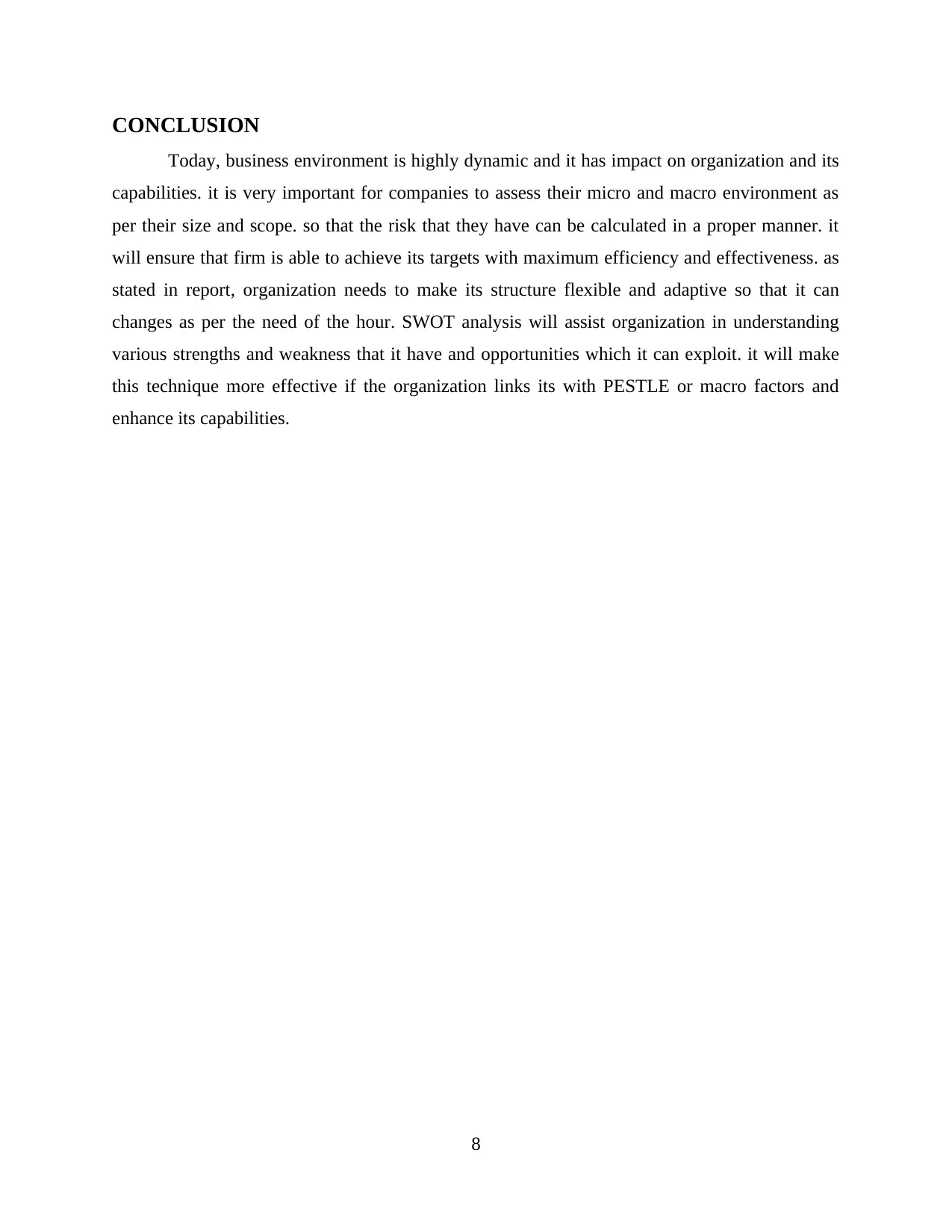
CONCLUSION
Today, business environment is highly dynamic and it has impact on organization and its
capabilities. it is very important for companies to assess their micro and macro environment as
per their size and scope. so that the risk that they have can be calculated in a proper manner. it
will ensure that firm is able to achieve its targets with maximum efficiency and effectiveness. as
stated in report, organization needs to make its structure flexible and adaptive so that it can
changes as per the need of the hour. SWOT analysis will assist organization in understanding
various strengths and weakness that it have and opportunities which it can exploit. it will make
this technique more effective if the organization links its with PESTLE or macro factors and
enhance its capabilities.
8
Today, business environment is highly dynamic and it has impact on organization and its
capabilities. it is very important for companies to assess their micro and macro environment as
per their size and scope. so that the risk that they have can be calculated in a proper manner. it
will ensure that firm is able to achieve its targets with maximum efficiency and effectiveness. as
stated in report, organization needs to make its structure flexible and adaptive so that it can
changes as per the need of the hour. SWOT analysis will assist organization in understanding
various strengths and weakness that it have and opportunities which it can exploit. it will make
this technique more effective if the organization links its with PESTLE or macro factors and
enhance its capabilities.
8
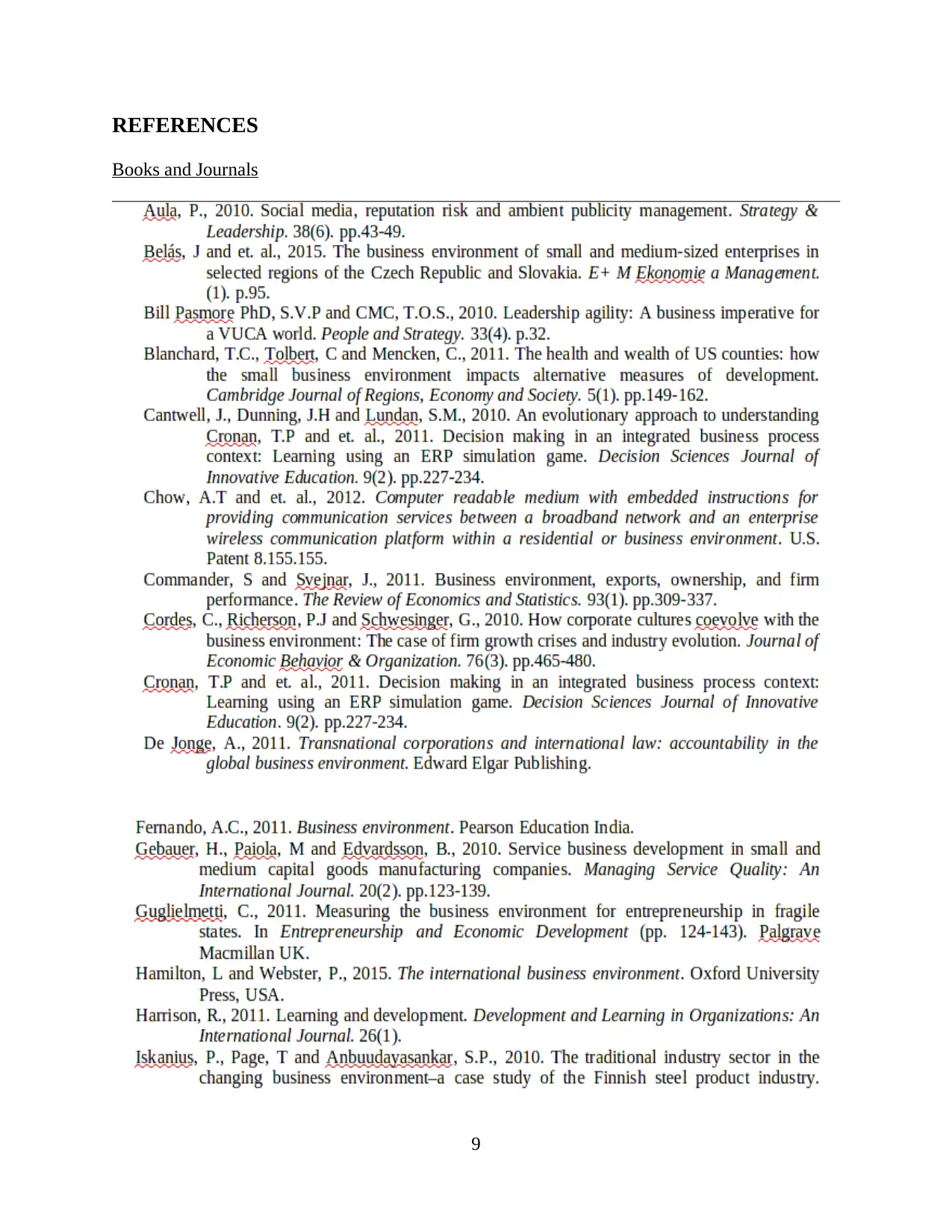
REFERENCES
Books and Journals
9
Books and Journals
9
⊘ This is a preview!⊘
Do you want full access?
Subscribe today to unlock all pages.

Trusted by 1+ million students worldwide
1 out of 13
Related Documents
Your All-in-One AI-Powered Toolkit for Academic Success.
+13062052269
info@desklib.com
Available 24*7 on WhatsApp / Email
![[object Object]](/_next/static/media/star-bottom.7253800d.svg)
Unlock your academic potential
Copyright © 2020–2026 A2Z Services. All Rights Reserved. Developed and managed by ZUCOL.





